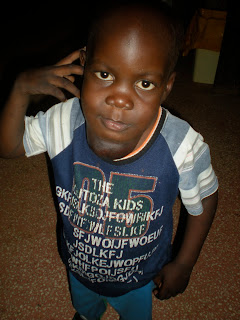Today I had the opportunity to join Susan, an American linguist doing research for several weeks here in Kenya, at the school for the deaf. We took a taxi several miles outside of town on bumpy, BUMPY roads. We passed a secondary school and lots of cows and goats, then arrived at the school for the deaf. The facility itself houses and sleeps up to 80 kids with hearing impairments, from grade 1-8. There is a modest kitchen with several huge sufurias, cooking pots, where they make every meal in bulk. There are four, maybe five? classrooms, each with a chalkboard, dirt floors, several desks, a handmade poster or two, and many, many students. Interestingly enough, since there aren’t enough classrooms for the amount of kids, each classroom is divided in two, and there’s a chalkboard at each end. The students in one class sit facing one chalkboard, and the students in the other class sit facing the other chalkboard, but all in the same room. I found this quite a clever way to make use of the space and divide the classroom. However, just because these kids are deaf doesn’t mean they’re silent. The teachers must go crazy trying to concentrate with not only another teacher in the same room, but also with the vocalizations from many students.
I was nervous as we approached-I don’t know sign language! I was flustered and said to Susan as we walked up, “Uhhh I don’t know anything, how do I sign ‘hello’?!” “Just wave.” Ohhh riiiiiight.
The kids were very warm and friendly, and started signing furiously to Susan to ask about her friend. She told them where I’m from, what I do, and spelled my name in sign language. They asked if I knew any sign, and she answered no, so they immediately wanted to teach me how to sign my own name. They also gave me a “nick-sign,” if you will: the letter K across your body to your shoulder. It was funny to talk to Susan about her experiences at the deaf school. She is fluent in ASL, American Sign Language, but unfortunately it’s slightly different than Kenyan Sign Language. She has stories of funny mishaps. For example, the sign “nice” in ASL is the same as the sign “clean” in KSL. So, she would sign, “Nice to meet you,” but the kids often giggled because she was saying, “Clean to meet you.”
I had to remind myself not to get frustrated, but it was difficult. Talk about a language barrier. Now a days when I’m greeted by a group of (hearing) Kenyan children, I feel at ease. I’ve discovered my ways of connecting with them. I understand the basics of how to greet and ask how their day is, how they’re feeling, what they had for lunch, etc etc. And I know some goofy Swahili songs that gets me “in” right away. But with these kids, it felt like I was back at square one, I literally don’t know the first thing. It was a good introduction to the school though, and the teachers were very friendly. We chatted and ate a lunch of githeri, a mixture of corn and beans, while the kids played outside.
I know that there are definitely ways a Music Therapist can work with the deaf population. I remember observing an MT who worked with pre-school aged kids who had cochlear implants. The connection between music and early language development in her work was so evident, and the role of music so important. This population is different however, in that these kids will grow up using sign language as their first language and primary method of communication. Susan explained to me that many individuals in the deaf community, in Kenya, the states, and elsewhere, do not view being deaf as an impairment. They may become frustrated when someone suggests something like a cochlear implant, because it implies that there is something, in fact, to corrected. Hopefully I’ll be able to incorporate some drumming or other activities where the children can feel the vibrations. It’s funny, just because kids can’t hear doesn’t mean they can’t benefit from music.
Also, a side note on safety:
Some of you may know that there is a bit of turmoil between Kenya and Somalia right now. Al Shabaab militants have been trying to overturn Somalia’s government for quite some time, and they’ve been linked to recent kidnappings of Kenyans and tourists along the coast. Kenya has been forced to intervene and recently sent troops across the border into Somalia to pursue suspected Islamic militants. BUT just know that I am safe and sound, and taking precautions. (You’ll be happy to know that I no longer plan on running a half marathon in Nairobi this weekend, as there have been some bombings there. You’re welcome, mamabear!) The Indiana University-Moi University partnership is a strong one, and we’ve been told that if there is even a slight chance we’re in danger, Joe Mamlin, head of the program and director of AMPATH, would send us home in a heartbeat. So, if you see shenanigans in the news, don’t worry, I’m A-OK.





